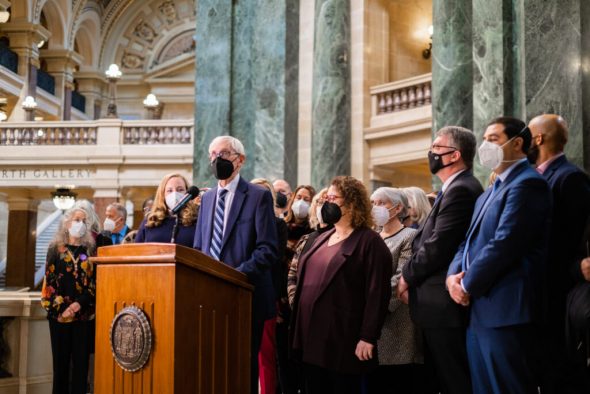Evers Surplus Plan Offers Tax Rebate
$150 per person, plus child care tax credit and greater education funding. Republicans dismissive.

Gov. Tony Evers courtesy Evers Facebook
With a mix of direct rebates to taxpayers, tax credits and education funding increases, Gov. Tony Evers rolled out a plan Thursday for more than one-third of the state’s projected $3.8 billion revenue surplus.
The $1.7 billion proposal, detailed in draft legislation, includes $815.7 million to send checks of $150 to every resident and a $611 million boost to public education. It provides $111 million to the university system and $28 million to technical colleges.
At a Capitol press conference, Evers billed the surplus as a sign of the state’s economic rebound in the COVID-19 pandemic. But he also suggested it was an opportunity to support businesses and households confronting pandemic-related challenges. And he drew attention, by contrast, to statements from Republican leaders in the Legislature who have indicated they would wait until the 2023 budget cycle to allocate the money.
“We’re not only recovering but we’re in a strong fiscal position going forward,” Evers said. “And we’re in a strong fiscal position to get things done. Because that surplus won’t do us any good just sitting here in Madison until the summer of 2023. We have the resources to make sure that every family and every community is doing just as well as our state’s economy.”
Evers said he saw room for “common ground” with the Republican lawmakers who hold majorities in both houses of the Legislature, but in their initial reactions, GOP leaders were dismissive.
Details of the plan
The single largest expenditure in the proposal is the proposed tax rebate of $150 per person. The rebate would be awarded based on the number of dependents on a tax return; a household of four, for example, would receive $600.
The bill’s education package combines increases in per-pupil funding and other forms of aid, a property tax relief component, and targeted funding for a range of education-related needs.
It would increase state special education aid by $172.6 million, increasing district reimbursement for special education to 40% from the current 30%. It would spend $103.7 million to increase the aid to school districts by $132 per pupil, to $870.
The Evers proposal would increase the state’s revenue limit for school districts by $200 per pupil while also increasing general equalization aid to school districts by $188 million, so that the revenue limit increase would not fall on property taxpayers.
Because state law requires that state support for charter schools and private voucher schools rise along with aid to public schools, the bill includes $23.4 million to increase their funding by $642 per pupil.
The bill also includes nearly a dozen other items, such as $20 million for lead testing and remediation in schools, $20 million for more reading teachers and specialists, $18.3 million for bilingual and bicultural aid, $18 million to expand school mental health aid.
“The elements of this proposal are crucially important for school districts across the state,” said Chris Thiel, Milwaukee Public Schools legislative policy manager.
The increase in special education funding “is something that school districts across the state have been calling for,” he added. “That funding has fallen far below where it used to be, and we are now close to the bottom of the country when it comes to supporting students with disabilities.”
The Wisconsin Public Education Network praised the governor’s proposal, noting that its recommendations echoed those of a bipartisan group of lawmakers three years ago in a report commissioned by the Legislature’s Republican leaders.
“Notably, nearly every proposal in the plan provides desperately needed resources to fund the 2019 recommendations of the bipartisan Blue Ribbon Commission on School Funding,” the public education network stated. “The last state budget did not meet these needs. The federal funds for pandemic relief do not meet these needs. We ask the legislature to do their job and meet the needs of Wisconsin’s kids now.”
Reactions from the Legislature
Democrats rallied around the governor’s proposal. Sen. LaTonya Johnson (D-Milwaukee), who is the lead sponsor for the draft bill, said the child care tax credit would help with one of the leading obstacles for many people who have stayed out of the workforce.
“This will also help put access to high quality childcare for their children within reach, in a day and time when the cost of infant care in our state can be more than the cost of college,” Johnson said at Evers’ press conference.
Evers said that between the plan’s money for households and aid for schools and child care, the plan should appeal to the Republican majority in the Legislature. “Wisconsinites can’t wait — they need help now,” he said. “I’ve got a plan to do it, and I know Republicans and I can find common ground.”
In a statement, Rep. Greta Neubauer (D-Racine), the Assembly minority leader, challenged Republicans to join the Democrats to advance the measure. With the projected $3.8 billion surplus by June of 2023, “it is clear that we need to seize the moment and help workers, families, businesses, and schools across the state,” she said.
But the initial Republican response Thursday pointed to a standoff, drawing the outlines for the political rhetorical battle ahead.
Assembly Speaker Robin Vos (R-Rochester) quoted Rep. Gordon Hintz (D-Oshkosh), who as minority leader in 2018 dismissed a Republican sales tax holiday and temporary child tax credit as an “election year bribe.”
“With a surplus this size, we are committed to permanent, generational tax reform, as also seen in every Republican budget over the last decade,” Vos stated.
“Senate Republicans will not gamble with a projected state surplus to fund Tony Evers’ re-election gimmicks,” stated Senate Majority Leader Devin LeMahieu (R-Oostburg). He called on Evers instead to use “federal ‘Biden bucks’” — the state’s pandemic relief funds from the federal American Rescue Plan Act — “to fund his re-election gimmicks without risking state taxpayer resources.”
“There’s good politics — direct money. And there’s good policy, in terms of child care, and there’s good policy and politics for schooling,” Lee says. He expects the education provisions to rally broad support, uniting teachers, administrators, school boards and parents. “This is, to a certain extent, the political triple crown — it’s good policy, it’s good politics and it’s good for people.”
Evers surplus plan combines tax rebates, education funding boost was originally published by Wisconsin Examiner.






















If we are overpaying taxes and have a surplus they should pass a property and income tax cut for all wisconsinites!
We should tax the rich and corporations more because they don’t pay their fare share. The rest of us pay for their slack.